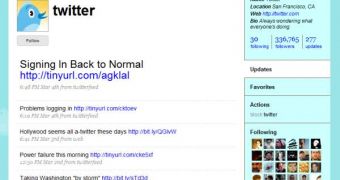The social media website Twitter has, over its years of existence, gathered a huge following, and, more recently, a number of celebrities including politicians, TV presenters and music/movie stars as well. What originally started as a project built in two weeks, and then released to the public just to “see if they like it” became in little over 3 years a benchmark website on the Internet, on which even popular TV show hostess Oprah Winfred started making an appearance a few days ago. Politicians on the Capitol Hill also use the tool to stay connected with their voters, and some of them have a great number of followers on the micro-blogging service.
In a recent interview with Oprah, Twitter CEO Evan Williams asked the host to tweet live during the show. “It was a brilliant coup. A week ago I would ask my non-geek friends if they had ever heard of Twitter and they would say no. Today they know exactly what I am talking about and it's all down to Oprah,” Ann Handley, who is a representative of Marketing Profs, explained to the BBC. She herself has a Twitter following of more than 28,000 people. The move brought the once-thought-for-kids service into the homes of the average American.
As evidenced by statistics supplied by market tracker firm Hitwise, logins on Twitter increased 43 percent in the days after Oprah's show, which is again a testament to the power of television over the average man and woman. Internet experts say that the rise of Twitter, from a side project to a mainstream destination, is something so amazing, that, when reading the numbers, you'd think they are fake. The site grew several times over in just three years, clearly out-classing popular destinations such as MySpace, Facebook and Bebo.
“The messages would say things like 'away for coffee', 'not at my desk' and 'too busy to chat', which were not that interesting in and of themselves. The real trick was to look at all of these messages as a whole where they were kind of compelling and showed all these people out and about doing stuff,” said Biz Stone, the co-founder of the website. He added that the whole thing started when he looked at instant messenger status screens, and saw only plain sentences, with “no life” in them. “We literally built Twitter in two weeks and just put it out there to see if people liked it. If that early feedback hadn't been so supportive, I'm not sure we would have kept on the way we did.”
“Twitter has changed the way businesses market and communicate with customers. I am a Comcast customer and if I tweet about a problem, I will now get a response via Twitter. This is unprecedented in terms of the way companies have operated in the past. But there are still a lot of companies out there that are not sure how to leverage Twitter,” Ann Handley added.
“Twitter is a traditional dotcom company. They have a lot of visibility but they are not making any money. Until they start making money to pay the bills, their likelihood of surviving is relatively low. Oprah can't help you out if you are not making money. She rarely writes checks to support non-profitable companies,” Enderle Group Technology Analyst Rob Enderle summed up the problem for the BBC News.

 14 DAY TRIAL //
14 DAY TRIAL //